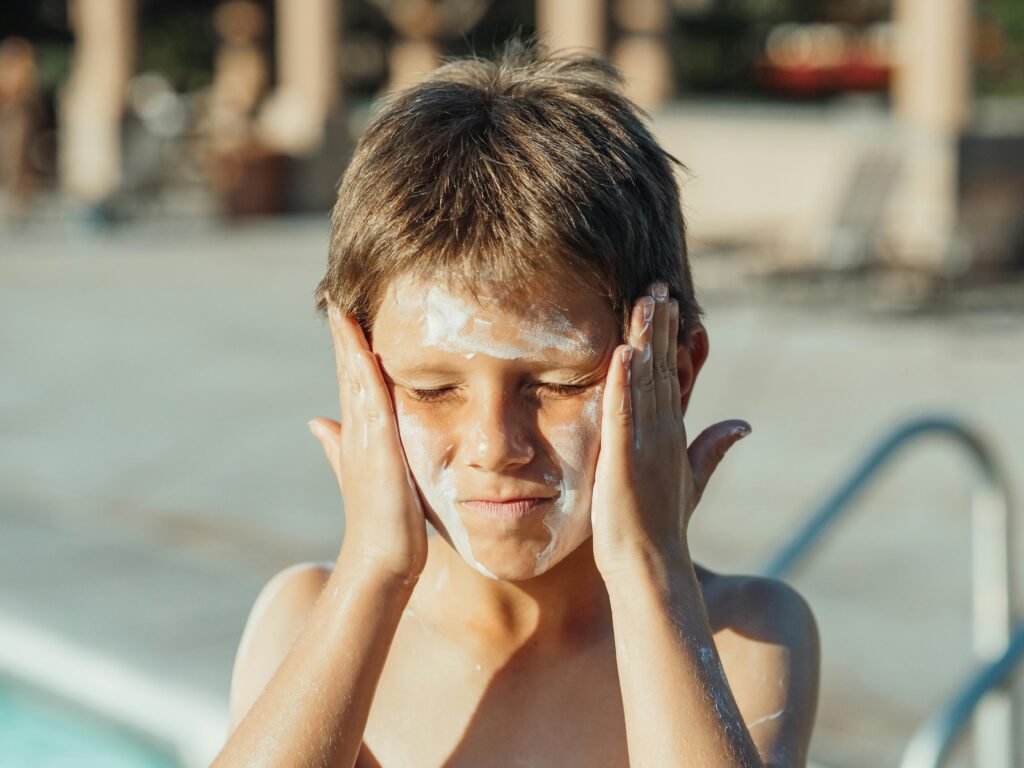Introduction
In the quest for radiant skin, many wonder: does sunscreen remove tan? It’s a common misconception that applying sunscreen can erase an existing tan. While sunscreen is vital for protecting the skin from harmful UV rays, its role in tan removal is often misunderstood. This article delves into the science behind tanning, the function of sunscreen, and effective strategies to fade a tan.
Understanding Tan — What It Really Is
What Causes Your Skin to Tan?
Tanning is the skin’s natural defense mechanism against ultraviolet (UV) radiation. When exposed to UV rays, particularly UVA and UVB, the skin produces melanin, the pigment responsible for skin color. This increase in melanin leads to the darkening of the skin, commonly referred to as a tan.
Types of Tanning — UVA vs. UVB Rays
- UVA Rays: Penetrate deep into the skin, leading to long-term skin damage and aging.
- UVB Rays: Affect the skin’s surface, causing sunburns and playing a significant role in developing skin cancer.
Melanin Production and Its Role
Melanin acts as a natural sunscreen by absorbing UV radiation. However, excessive UV exposure overwhelms this defense, resulting in tanning and potential skin damage.(Wikipedia)
Is Tan a Sign of Skin Damage?
Yes. A tan indicates that the skin has been exposed to UV radiation, leading to DNA damage. Over time, this can increase the risk of premature aging and skin cancers.
Can Skincare Alone Answer “Does Sunscreen Remove Tan”?
When readers ask, does sunscreen remove tan, they’re often hoping for a single-step solution to reverse sun exposure. Unfortunately, no topical sunscreen—chemical or physical—can actively fade a tan that has already developed. However, integrating sunscreen into your skincare routine prevents further darkening and supports other de-tanning efforts like exfoliation and the use of brightening agents. So while the answer to does sunscreen remove tan is technically no, sunscreen plays a crucial role in any long-term strategy to regain even-toned, healthy skin.
Sunscreen — Protection, Not a Tan Eraser
What Sunscreen Actually Does
Sunscreen is designed to protect the skin from UV radiation. It contains active ingredients that either absorb or reflect UV rays, preventing them from penetrating the skin.
Blocking vs. Absorbing UV Rays
- Chemical Sunscreens: Absorb UV radiation and convert it into heat, which is then released from the skin.
- Physical Sunscreens: Contain minerals like zinc oxide or titanium dioxide that reflect UV rays away from the skin.
Preventative, Not Corrective Action
It’s crucial to understand that sunscreen does not remove tan. Instead, it prevents further UV-induced skin damage. Applying sunscreen after tanning won’t fade the existing tan but will protect against additional darkening and skin harm.
Can Sunscreen Undo a Tan That’s Already There?

No. Sunscreen cannot reverse a tan. Its primary function is to shield the skin from future UV exposure. To fade an existing tan, other methods must be employed.
The Reality Behind “Does sunscreen remove tan” Beliefs
The belief that sunscreen can eliminate a tan stems from its protective properties. While it prevents new tanning, it doesn’t possess ingredients that actively lighten or exfoliate the skin to remove an existing tan.
De-Tanning Myths and Misconceptions
Common Skincare Misunderstandings
- Myth: Sunscreen can fade an existing tan.
- Reality: Sunscreen prevents further tanning but doesn’t lighten the skin.
Can Sunscreen Reverse Tanning Effects?
No. To reverse tanning effects, one must incorporate skincare routines that promote skin renewal and lightening.
Why SPF Doesn’t Mean Tan Reversal
SPF indicates the level of protection against UVB rays. A higher SPF means more protection but doesn’t equate to tan removal.
How to Actually Fade a Tan
Dermatologist-Approved Methods
Exfoliation & Skin Renewal
Regular exfoliation removes dead skin cells, promoting the growth of new, untanned skin. Using gentle scrubs or chemical exfoliants like alpha-hydroxy acids can expedite this process.
Use of Brightening Ingredients (Vitamin C, Niacinamide)
Incorporating serums or creams containing Vitamin C or Niacinamide can help lighten hyperpigmentation and even out skin tone.
Lifestyle Habits for Quicker Tan Fading
- Stay hydrated to support skin health.
- Maintain a balanced diet rich in antioxidants.
- Avoid prolonged sun exposure, especially during peak hours.
Why Consistent Sunscreen Use Still Matters
Does Wearing Sunscreen Prevent Future Tan Buildup?
Yes. Regular application of sunscreen prevents additional UV exposure, reducing the likelihood of further tanning.
Long-Term Skin Benefits of Daily SPF
- Protects against premature aging.
- Reduces the risk of skin cancers.
- Maintains an even skin tone by preventing hyperpigmentation.
Protection from Hyperpigmentation & Premature Aging
Consistent sunscreen use shields the skin from UV-induced pigmentation and the breakdown of collagen, which leads to wrinkles and fine lines.
FAQs About Sunscreen and Tanning
Can I Get Tanned Even with Sunscreen On?
Yes. While sunscreen significantly reduces UV exposure, no sunscreen offers 100% protection. Prolonged sun exposure can still lead to tanning.
How Often Should I Reapply Sunscreen to Avoid Tanning?
Reapply sunscreen every two hours, or immediately after swimming or sweating, to maintain optimal protection.(The Sun)
Does Applying Sunscreen Remove Tan if Used Long Term?
No. Long-term use of sunscreen prevents new tanning but doesn’t fade existing tans. Incorporate skin-lightening products and exfoliation for tan removal.
Conclusion
Recap — Does Sunscreen Remove Tan?
In summary, sunscreen does not remove tan. Its primary role is to protect the skin from harmful UV rays, preventing further tanning and skin damage.
The Short Answer vs. the Scientific Truth
While it’s tempting to believe that sunscreen can erase a tan, the scientific reality is that it serves as a preventive measure, not a corrective one.
Final Thoughts on Sun Protection & Skin Health
For effective tan removal, focus on skincare routines that promote exfoliation and skin brightening. Simultaneously, maintain consistent sunscreen use to protect against future tanning and uphold overall skin health.
More about skincare
- Understanding UVA and UVB Rays
- Effective Exfoliation Techniques
- Benefits of Vitamin C in Skincare
- Importance of Daily SPF
Note: This article aims to provide general information on the topic. For personalized skincare advice, consult a dermatologist.